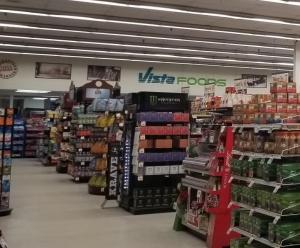Lighting up Laconia's Vista Foods

Vista Foods in Laconia, New Hampshire, has been a vital community member for more than a decade. Grocery stores are often a cornerstone of a community, going year to year without much change. However, this past spring, store manager Bob Fitzpatrick and Associated Grocers of New England’s (AGNE) general manager Tim Merrill realized that Vista Foods was ready for some changes.
Years of 24/7 use meant that the compressors on the food freezers were not running efficiently. The store’s outdated lighting gave the store a yellow tinge, detracting from the overall look of the store. To top it off, all the cardboard packaging (and there was a lot) went into dumpsters that came with expensive dumping fees.
So, when Andrea O’Brien, director of New Hampshire Small Business Development Center’s (NH SBDC) Business Sustainability Program (BSP), invited Vista Foods to participate in Manomet’s Grocery Stewardship Certification Program, they realized that they were a prime candidate for the program.
Creating a more comfortable working environment and more attractive shopping experience with new lighting, better efficiency from the refrigeration compressors, and updated recycling practices were all things that were important to the store management. So, Vista Foods decided to take advantage of this opportunity for a critical assessment of their energy usage and waste management practices.
A lot has changed since that invitation. Bob says, “Everything looks awesome now,” and the store is realizing a substantial savings on its dumpster fees, and analyzing effects on its overall energy costs.
The NH SBDC’s BSP works one-on-one with all types of businesses across the state to help them assess their environmental management practices, energy efficiency, and employee safety programs, along with other management areas that can affect the business’ long-term sustainability. Andrea and the BSP work with several partners that can help with assessments and provide other resources to the businesses working towards improvement.
As Andrea explains, there is no one way to become more sustainable; each business that participates in the BSP has unique challenges, and so each one will have a different path to sustainability and success. Grocery stores in particular use a lot of energy around the clock.
“It’s huge,” Andrea says. “The U.S. EPA has calculated a 1:18 ratio in comparing energy savings to revenue for the grocery sector. That means that every dollar in energy savings is equivalent to $18 in revenue. To cover $1 on a grocery store energy bill the store has to sell $18 of merchandise, so a $100 reduction in your energy bill equates to an increase in sales of approximately $1,800.”
Grocery stores operate on lean profit margins and must watch their overhead costs carefully. Savings anywhere in the organization can reap substantial rewards.
Using a 214-point assessment developed by Manomet (the Massachusetts-based nonprofit whose mission is to engage with people using science to make the natural world, forest, food, and economic systems more sustainable), Andrea began to work with Vista Foods and its parent company, AGNE.
First, Bob Fitzgerald and Tim Merrill received the assessment and Bob went through it at Vista Foods. Andrea then came to the store to go over the results. “She showed us where we ranked with the assessment and she was awesome,” Bob said. “We checked all the coolers—were they running at the proper temperature?—the gaskets around the coolers, the lighting in all our departments, inside and out; and the recycling,” Bob said.
Andrea summarized the findings and then issued a report to Tim, who made the decision to use it as a guide toward improving the store’s footprint and cutting the store’s energy costs.
Subsequently, Bob and Tim found a company that could recycle all the cardboard—and a grocery store produces a lot of cardboard waste. Now, all of it is recycled. They’re down to two remaining trash bins—one for other recyclables and one for food waste.
Pursuing the Grocery Stewardship Certification also resulted in replacement of some 7,087 linear feet of florescent lamps by Energy LB, LLC of Nashua. They were swapped out and recycled in favor of white LEDs that have a 10-year lifespan. “It has so improved the appearance of the store,” Bob says. “Now, it’s brilliant white and we can be seen on the outside.”
The lighting replacements took place this past summer, with the help of lighting rebates from Eversource. The old lighting fixtures were purchased by a recycler. Additionally, all the refrigeration compressors were tuned-up as well. “It didn’t disrupt things too much,” Bob said. “And we’re all just so happy with it.”
“Tim really embraced the program,” Andrea said, noting that he has now undertaken assessments at each one of the AGNE stores. As with all business owners or managers in the BSP, he’s looking at how to add value to the company. Most customers today expect businesses to have an awareness of their environmental footprint and to engage in social change in this way, Andrea says. “It’s what our current consumer culture, and in particular millennials, expects from those with whom they do business.”
Energy and recycling improvements and operational savings resulted from the Grocery Stewardship Certification Program. In the end, improving sustainability at a business will likely improve the bottom line, and that’s really the key.
Bob has enjoyed running with this idea of Tim’s. “I’m just glad that we are definitely going in the right direction in energy usage and recycling,” he said. “It helps the economy and has helped everybody all around.”
